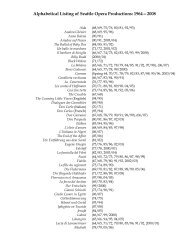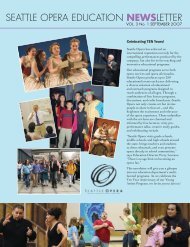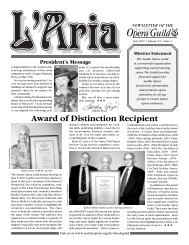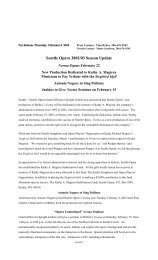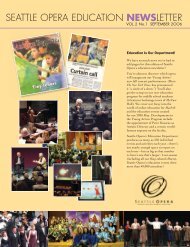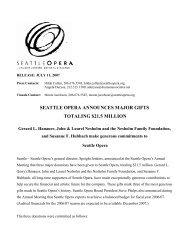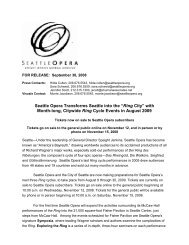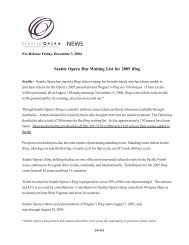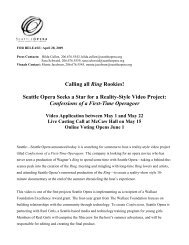You also want an ePaper? Increase the reach of your titles
YUMPU automatically turns print PDFs into web optimized ePapers that Google loves.
his health, and kept her on as a maid when he<br />
recovered. The girl’s name was Doria Manfredi;<br />
she belonged to a respectable family in their<br />
village of Torre del Lago and by all accounts was<br />
a hard worker and a gentle, pleasant person.<br />
In 1904, Elvira Gemingani’s husband died and<br />
she was finally free to marry Puccini (for more<br />
context see page 46). No sooner had she married<br />
him than she became jealous and possessive. She<br />
grew suspicious of her husband with Doria, their<br />
pretty maid. One evening in the autumn of 1908<br />
Elvira found the two of them talking near the<br />
garden. She accused Doria of having an affair<br />
with her husband, fired her, slandered her in the<br />
town, and urged the priest to excommunicate<br />
her. Puccini was a well-known womanizer, and<br />
many citizens of Torre del Lago believed Elvira.<br />
Poor Doria, unable to endure the suspicion and<br />
scandal, took poison and died.<br />
Doria’s family had an autopsy performed, and it<br />
was determined that the girl had died a virgin.<br />
They took Elvira Puccini to court for defamation<br />
of character and won the case. Elvira would have<br />
had to spend five months in prison,<br />
had Puccini not paid off the family.<br />
Although at first he wanted a separation,<br />
eventually the composer<br />
was reconciled with his wife.<br />
Years later, Puccini wrote a friend, “Always before<br />
my eyes I have the image of that poor victim<br />
and her suffering at the hands of a powerful<br />
woman.” And years after that, he dramatized this<br />
encounter, between Liù and Turandot, between<br />
Suor Angelica and her aunt. When Puccini<br />
played the score of Suor Angelica for his sister<br />
Iginia, who was a nun, she and her fellow sisters,<br />
in tears, offered absolution to Puccini’s fictional,<br />
sinful, loving, suffering Angelica.<br />
Speight Jenkins Introduces<br />
The Artists of La Voix Humaine<br />
and Suor Angelica<br />
Elle:<br />
Nuccia Focile<br />
Soprano (Militello, Sicily)<br />
Recently at <strong>Seattle</strong> <strong>Opera</strong>:<br />
Violetta, La traviata (’09)<br />
One of the world’s best<br />
loved sopranos, Ms.<br />
Focile scored a great<br />
success with La voix<br />
humaine in London. She has sung both Mimì<br />
and Violetta in <strong>Seattle</strong> and is a frequent artist<br />
at all the major opera houses of the world.<br />
Angelica:<br />
Maria Gavrilova<br />
Soprano (Chelyabinsk City,<br />
Russia)<br />
<strong>Seattle</strong> <strong>Opera</strong> debut<br />
This Russian-born artist<br />
has a rich Verdi or verismo<br />
voice, scoring major<br />
successes in Europe and<br />
at the Metropolitan <strong>Opera</strong>.<br />
The Princess:<br />
Rosalind Plowright<br />
Mezzo-Soprano (Worksop, UK)<br />
Recently at <strong>Seattle</strong> <strong>Opera</strong>:<br />
Klytämnestra, Elektra (’08)<br />
Over a great career in<br />
England, Europe and<br />
the United States, Ms.<br />
Plowright has always<br />
amazed her audiences with her grasp of<br />
the innermost meanings of the words that<br />
she sings. Her Klytämnestra here in 2008<br />
was astonishing in her power and curious<br />
vulnerability.<br />
Conductor<br />
Gary Thor Wedow<br />
(La Porte, IN)<br />
Recently at <strong>Seattle</strong> <strong>Opera</strong>:<br />
Orphée et Eurydice (’12)<br />
Extraordinarily successful<br />
at <strong>Seattle</strong> <strong>Opera</strong><br />
with Gluck, Handel and<br />
Mozart, this brilliant conductor<br />
has spent much of his life conducting<br />
Italian and French opera of the nineteenth and<br />
twentieth centuries.<br />
Director<br />
Bernard Uzan<br />
(Paris, France)<br />
Recently at <strong>Seattle</strong> <strong>Opera</strong>:<br />
Attila (‘12)<br />
Set & Costume Designer:<br />
Pier Paolo Bisleri<br />
<strong>Seattle</strong> <strong>Opera</strong> debut<br />
Lighting Designer<br />
Connie Yun<br />
(East Lansing, MI)<br />
Recently at <strong>Seattle</strong> <strong>Opera</strong>:<br />
Orphée et Eurydice (’12)<br />
The sets and costumes<br />
were successful in<br />
Trieste; Uzan has staged<br />
some of the most interesting<br />
productions here in recent seasons and<br />
has a particular affinity both to verismo and<br />
the works of Poulenc and worked with Ms. Yun<br />
to achieve the memorable and telling lighting<br />
in Attila.<br />
Spotlights by Jonathan Dean, Director of Public Programs and Media and author of English captions for <strong>Seattle</strong> <strong>Opera</strong> since 1997.<br />
2012/13 Season at <strong>Seattle</strong> <strong>Opera</strong> 33




